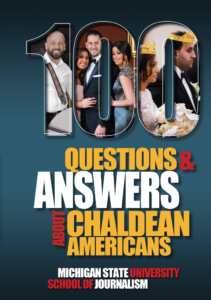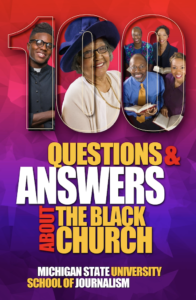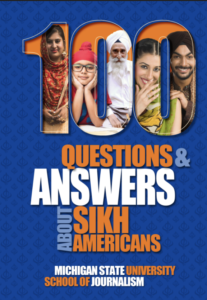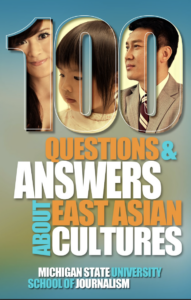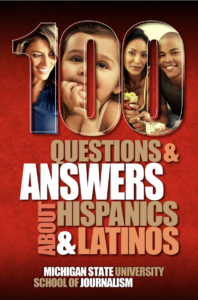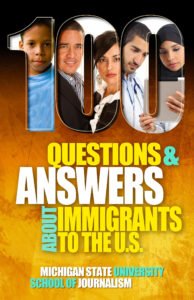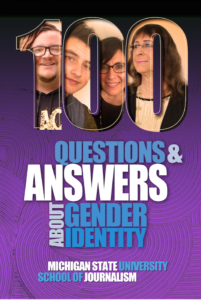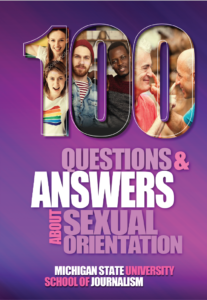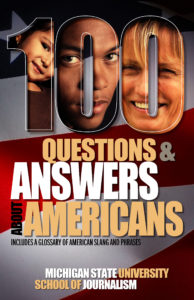These are some of the items from “100 Questions and Answers About African Americans.” We present a selection for free to share the information and to show you what the guide is like. You can order the guide in print or as an ebook from Amazon and other online booksellers.
Which is preferred, Black or African American?
Why do some people prefer to identify as Black?
Why do some people prefer African American?
What are Pan-Africanism and the Pan-African flag?
Can Black hairstyles be political?
Why does slavery have such a lasting effect?
What is affirmative action?
What is Kwanzaa?
Why is it OK for Black people, but not White people, to use the n-word?
What religions do African Americans follow?
Can Black people be prejudiced?
What does it mean to “play the race card?”
What percentage of the U.S. population is Black?
How does wealth compare among races?
Is sickle cell disease a Black condition?
Can African Americans get sunburned or tanned?
What are African American contributions to music?
What is hip-hop?
Is it true there are more Black men in prison than in college?
What are the statistics for Black-on-White homicides?
Which is preferred, Black or African American?
Either can be correct. Gallup has found since 1991 that half to two-thirds of African American and Black respondents have not had a preference. The terms do not necessarily mean the same thing. So, it can come down to individual preferences. It is best to ask. Black and then African American replaced older terms such as Colored and Negro imposed by others. Self-identification might reflect feelings about origin, affiliation, colonialism, enslavement and cultural dispossession.
Back to top | To order
Why do some people prefer to identify as Black?
The reasons vary. Some people may identify as Black because they do not feel connected to the American state. Others may identify as Black because they do not identify with the African continent. There are various historical, social and political reasons why one might prefer to identify as Black. The term has historically connected people of African descent around the world and was revived during the Black Power Movement.
Back to top | To order
Why do some people prefer African American?
Jesse Jackson popularized the term, which had already existed, in the 1980s. It mirrors hyphenated names for other American groups. Some people may identify themselves as African American to resist Black as a socially constructed category. Others may identify this way to assert their American identity. There are many reasons one might identify as African American.
Back to top | To order
What are Pan-Africanism and the Pan-African flag?
Pan-Africanism is a combination of political ideologies. It stresses the shared origins, economic and social interests held by people of African descent. A basic goal is to unify people worldwide through their African origins and culture. Pan-African unity is seen as essential to economic, political and social progress. The movement goes back to at least the mid 19th century and has roots in Africa, Europe and the Americas. Dr. W.E.B. DuBois convened a Pan-African Congress in 1919 in Paris. According to the Pan-African Alliance, Marcus Garvey’s Universal Negro Improvement Association is credited with creating the Pan-African flag in 1920. The flag has horizontal red, black and green stripes. Red represents the blood that links all Black people. Black represents their shared ancestral past. Green represents the unification of Africa. Pan-Africanism has also been represented by green, yellow and red.
Back to top | To order
Can Black hairstyles be political?
They can be. At times they have been very political. People might wear their hair to suit their style sense, personality, history, comfort or convenience. Some people change their hair often. Black hairstyles have creative varieties from natural to straightened to curled and different kinds of braids. Black hair can be long or short, elaborate or shaved, and worn up or down. It can incorporate weaves, extensions and beads. Some people use questions about hair to open up larger conversations and get to know more about the person.
Back to top | To order
Why does slavery have such a lasting effect?
Slavery remains an issue because current inequities are rooted in it. For many, slavery’s effects are manifested daily. It is echoed through limits on occupational mobility, income and wealth, property ownership, equitable education, the political process and higher rates of imprisonment. Some argue that multi-generational trauma has caused post-traumatic slavery syndrome.
Back to top | To order
What is affirmative action?
In the United States, affirmative action began under the Civil Rights Act of 1964. It was a way to address discrimination based on gender and race. Other countries also have affirmative action policies. Rulings expanded the U.S. law to include disability, ethnic origin and age. Affirmative action is used in employment, education, government contracts and more. Since 2000, several suits have been brought challenging the racial dimensions of U.S. affirmative action. One myth is that African Americans are the chief beneficiaries of affirmative action. That is not true. The U.S. Department of Labor has said that White women have been the primary beneficiaries of affirmative action policies.
Back to top | To order
What is Kwanzaa?
Kwanzaa is a celebration of African heritage and principles. It occurs Dec. 26 through Jan. 1. It grew out of the Black Nationalist Movement in the mid 1960s. Kwanzaa was created by Dr. Maulana Karenga, chairman of Black Studies at California State University. From the Swahili phrase “first fruits of the harvest,” Kwanzaa celebrates seven principles, which are also identified in that East African language. They are:
umoja (unity)
kujichagulia (self-determination)
ujima (collective responsibility)
ujamaa (cooperative economics)
nia (purpose)
kuumba (creativity)
imani (faith)
Kwanzaa also has seven symbols. They are fruits, vegetables or nuts; a mat; a candleholder; seven candles (three red, three green and one black); corn; gifts and a communal cup signifying unity. Kwanzaa was intended to be independent of religion, though some families celebrate Kwanzaa with religious holidays.
Back to top | To order
Why is it OK for Black people, but not White people, to use the n-word?
Many scholars theorize that the n-word is flipped, a feature of Black communication called semantic inversion. Inversion happens when African American Language speakers use a Standard American English word or phrase to mean its opposite. Vernacular speakers flip the definition of the n-word from negative to positive to reclaim power and self-identification. Some scholars argue the n-word is attached to race-based oppression, which they refer to as a cultural tax. White people, not having experienced this oppression, are not entitled to use the n-word that way. African Americans generally agree it is not OK for White people to use the n-word. Many people, Black and White, condemn its use by anyone. Some Black youth and others in the Hip-Hop Nation applaud it.
Back to top | To order
What religions do African Americans follow?
According to the Pew Research Center, 51 percent of the U.S. population overall affiliates with Protestantism. Fifty-nine percent of African Americans affiliate with historically Black Protestant churches. Historically Black churches include Baptist, Methodist, Pentecostal, Holiness and Non-denominational, among others. Fifteen percent of African Americans identified with Evangelical Protestant churches including Baptist, Non-denominational, Pentecostal and Restorationist. Twelve percent were unaffiliated, meaning they reported they were atheist, agnostic or nothing in particular. Four percent of African Americans identify with mainline Protestant churches. Five percent identify as Catholic and another 5 percent identify as something else. One percent of African Americans identify as Muslim. They comprise about a quarter of all American Muslims, who are about 1 percent of the nation’s total population.
Back to top | To order
Can Black people be prejudiced?
No race is free of bias and prejudice. People can be biased against people of other races and against people of their own race. Discussions about bias, prejudice and racism often turn on how those terms are interpreted. A good starting point for such discussions is an agreement on what they mean.
Back to top | To order
What does it mean to “play the race card?”
To say someone is “playing the race card,” is to say they are injecting race into a discussion. This can be an attempt to deflect, diminish or discredit race’s effects. Black feminist scholar bell hooks writes the expression “trivializes discussions of racism, implying it’s all just a game.” She calls this a backlash against talk about race, “more often than not representing it as mere hysteria.”
Back to top | To order
What percentage of the U.S. population is Black?
As of 2014, there were approximately 42 million Black citizens in the United States. That’s about 13 percent of the U.S. population. Black people were the largest minority group in the United States until 2001, when Hispanics surpassed them. These designations overlap because one is racial and the other is cultural. The 2010 U.S. Census reported that about 2.5 million of the nation’s 54 million Hispanics were Black. Gallup polls say people typically overestimate the percentages of the population that is Black or Hispanic.
Back to top | To order
How does wealth compare among races?
First, think of wealth as lifetime savings, not just income, which is money coming in every year. The Urban Institute reported Black families had accumulated an average of $11,000 in 2013, compared to $13,700 for Hispanic families and $134,200 for White families. White families currently have 12 times more wealth than Black families. The wealth gap nearly doubled between 1995 and 2013. Lower wages hinder wealth accumulation. Education can increase income and wealth, but student loan debt contributes to the wealth gap. Black families on average must borrow more money for someone to attend college, and degrees are less likely to lead to jobs. Black people are also less likely to own their own homes or have retirement savings, which are prime creators of inherited wealth.
Back to top | To order
Is sickle cell disease a Black condition?
Sickle cell trait is genetic, not racial. Some genetic disorders can be traced to certain geographic areas. Sickle cell disease occurs in approximately one out of every 315 African-American births, according to the National Heart, Lung and Blood Institute. The trait can lead to the disease in which red blood cells are sickle shaped, rather than rounded, and interfere with the body’s ability to distribute oxygen. The trait occurs among people with ancestry from areas where malaria is more common. According to the American Society of Hematology, “Sickle cell trait can also affect Hispanics, South Asians, Caucasians from southern Europe, and people from Middle Eastern countries.”
Back to top | To order
Can African Americans get sunburned or tanned?
African Americans can absolutely get sunburned or tanned. According to dermatologist Aletha Maybank in Ebony Magazine, African Americans have better sun protection and a decreased risk for skin cancer than Whites. Still, they do not have full coverage. The higher amount of melanin in the skin of African Americans can have a natural sun protection factor of as much as 13. That compares to a factor of 3-4 in people with white skin. With continual exposure to the sun, dark skin produces more melanin and darkens. African Americans also can have sunstroke. They develop skin cancer at very low rates compared to White people. However, Black skin cancer patients have lower survival rates than White patients.
Back to top | To order
What are African American contributions to music?
Black musicians and composers have played a major role in shaping modern American music. Drawing on African traditions, people developed music through slavery, in churches, in the field and in factories. Black music includes gospel and spirituals, ragtime, country, blues, jazz, soul and, more recently, rap and hip-hop. Black music has inspired several major musical genres including folk, rock ’n’ roll and pop. Black music continues to evolve and to spin off sub-genres.
Back to top | To order
What is hip-hop?
Hip-hop is often identified as just a music form, but it goes well beyond music. Originating in New York’s South Bronx in the 1970s, hip-hop includes four elements: deejaying (also known as DJing or turntabling), MCing (emceeing or rapping), graffiti painting and breakdancing (B-boying). Hip-hop has been adapted by cultures around the world.
Back to top | To order
Is it true there are more Black men in prison than in college?
No, this is a myth. According to the Bureau of Justice Statistics, 526,000 Black men were in prison in 2013. That year, the National Center for Educational Statistics reported that 1,437,363 were enrolled in college. The myth has been used to illustrate high rates of imprisonment for Black men. According to the Bureau of Justice Statistics, Black males were imprisoned at rates 2.5 times greater than for Hispanic males and six times higher than for White males. Black convicts are also more likely to be imprisoned than others who commit the same crimes.
Back to top | To order
What are the statistics for Black-on-White homicides?
FBI statistics for 2014 show a prevalence of within-race violence, contrary to common perceptions. According to the FBI, 82 percent of the 3.021 White homicide victims were killed by White assailants. Fifteen percent were killed by Black assailants. For the nation’s 2,451 Black homicide victims, 90 percent were killed by Black assailants. Eight percent were killed by White assailants. Northeastern University Criminology professor James Alan Fox has written that, “Because of the racial homogeneity of most neighborhoods . . . most stranger killings are” among people of the same race.
Back to top | To order

